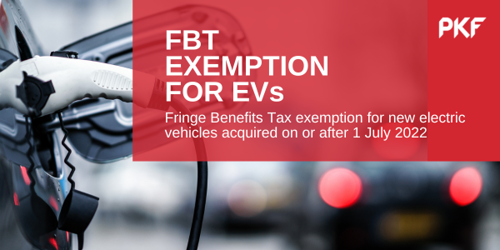FBT Exemption for EVs

Recent legislative changes provide significant advantages to small and medium business owners who are interested in acquiring an Electric Vehicle (EV). The Australian Government introduced an Fringe Benefits Tax (FBT) exemption for new EVs acquired on or after 1 July 2022. This incentive is offered as part of the Government’s commitment to transitioning to a low-emissions economy.
Which EV’s are exempt?
The exemption covers zero or low emission vehicles, with values below the luxury car tax threshold for fuel efficient cars (currently $84,916), being:
- Battery electric vehicles
- Hydrogen fuel cell electric vehicles
- Plug-in hybrid electric vehicles – if the car has an internal combustion engine, it will only qualify if it can be recharged by an off-vehicle power source.
Second hand cars can qualify, but only if their first retail sale was on 1 July 2022 or later.
What are the benefits of the exemption?
The FBT exemption for EVs provides several benefits for businesses, including:
- Cost savings: The FBT exemption helps to reduce the overall cost of the EV relative to traditional internal combustion engine, making it a more attractive option for businesses.
- Environmental benefits: By promoting the use of EVs, businesses can reduce their carbon footprint. Increasingly, customers and suppliers are rewarding businesses with strong ESG credentials with better pricing.
- Employee satisfaction: Providing EVs to employees can be a great way to attract and retain talented staff.
How can my business benefit?
Business owners can take advantage of the FBT exemption for EVs either by providing eligible EVs to their employees or by allowing employees to salary package an eligible EV.
Salary packaging is a popular option for businesses as it allows employees to sacrifice a portion of their pre-tax salary in exchange for a non-cash benefit. Typically, when this occurs FBT is levied on the employer. However, the exemption for EVs reduces the amount of salary that is required to be sacrificed in order to acquire the vehicle.
What are the record-keeping requirements?
Business owners must keep records to evidence that the EV is eligible. That is, the vehicle cost is less than the luxury car tax limit, was acquired on or after 1 July 2022, and the model meets the criteria. For this it would be sufficient to retain a copy of the invoice and lease agreement, if applicable.
While the employer may be exempt from FBT liability, the value of the benefit provided still needs to be calculated so that the amount can be included in the employee’s reportable fringe benefit (RFB).
Therefore, it will be necessary to keep a log-book to record the vehicle’s business use percentage, and to keep records of running costs, an annual odometer reading, and any employee contributions towards the cost of owning and maintaining the vehicle.
These records must be kept for a minimum of five years.
More Information
For more information about how you or your business can benefit from the FBT exemption for electric vehicles, please contact your PKF Advisor.

